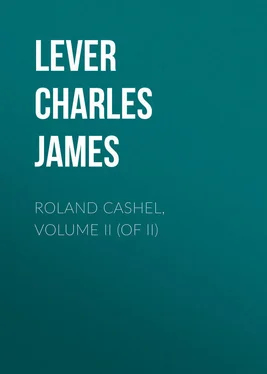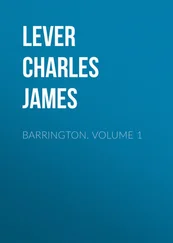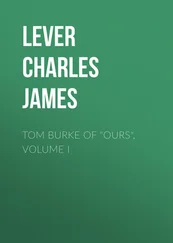Charles Lever - Roland Cashel, Volume II (of II)
Здесь есть возможность читать онлайн «Charles Lever - Roland Cashel, Volume II (of II)» — ознакомительный отрывок электронной книги совершенно бесплатно, а после прочтения отрывка купить полную версию. В некоторых случаях можно слушать аудио, скачать через торрент в формате fb2 и присутствует краткое содержание. Жанр: literature_19, foreign_antique, foreign_prose, на английском языке. Описание произведения, (предисловие) а так же отзывы посетителей доступны на портале библиотеки ЛибКат.
- Название:Roland Cashel, Volume II (of II)
- Автор:
- Жанр:
- Год:неизвестен
- ISBN:нет данных
- Рейтинг книги:5 / 5. Голосов: 1
-
Избранное:Добавить в избранное
- Отзывы:
-
Ваша оценка:
- 100
- 1
- 2
- 3
- 4
- 5
Roland Cashel, Volume II (of II): краткое содержание, описание и аннотация
Предлагаем к чтению аннотацию, описание, краткое содержание или предисловие (зависит от того, что написал сам автор книги «Roland Cashel, Volume II (of II)»). Если вы не нашли необходимую информацию о книге — напишите в комментариях, мы постараемся отыскать её.
Roland Cashel, Volume II (of II) — читать онлайн ознакомительный отрывок
Ниже представлен текст книги, разбитый по страницам. Система сохранения места последней прочитанной страницы, позволяет с удобством читать онлайн бесплатно книгу «Roland Cashel, Volume II (of II)», без необходимости каждый раз заново искать на чём Вы остановились. Поставьте закладку, и сможете в любой момент перейти на страницу, на которой закончили чтение.
Интервал:
Закладка:
“Oh, that is easily had – go on, signor.”
“Well, I wish to go over to-morrow by daybreak to Limerick. I desire, too, that you should accompany me – as my companion, however, and my equal. We are about the same height and size, so take that suit there, dress yourself, and wait for me at the cross-roads below the village.”
The Italian took the parcel without speaking, and was about to retire, when Linton said, —
“You can write, I suppose?”
The other nodded.
“I shall want you to sign a document in presence of witnesses – not your own name, but another, which I’ll tell you.”
The Italian’s dark eyes flashed with a keen and subtle meaning, and leaning forward, he said in a low, distinct tone, —
“His Excellency means that I should forge a name?”
“It is scarcely deserving so grave a phrase,” replied Linton, affecting an easy smile; “but what I ask amounts pretty much to that. Have you scruples about it?”
“My scruples are not easily alarmed, signor; only let us understand each other. I’ll do anything ” – and he laid a deep emphasis on the word – “when I see my way clear before me, nothing when I am blindfolded.”
“A man after my own heart!” cried Linton; “and now, good-night. Be true to the time and place.” And with this they parted.
The gray mist of a winter morning was just clearing away as Linton, accompanied by Giovanni, drove up to the principal hotel of Limerick, where Mr. Hammond, the eminent barrister, was then stopping. Having ascertained that he was still in the house, Linton at once sent up his name, with a request to be admitted to an interview with him. The position he had so long enjoyed among the officials of the Viceroy had made Linton a person of considerable importance in a city where the “plated article” so often passes for silver: and no sooner had the lawyer read the name, than he immediately returned a polite answer, saying that he was perfectly at Mr. Linton’s orders.
The few inquiries which Mr. Linton had meanwhile made at the bar of the hotel informed him that Mr. Hammond was making all haste to England, where he was about to appear in a case before the House of Lords; that horses had been already ordered for him along the whole line of road, and his presence in London was imperative. Armed with these facts, Linton entered the room, where, surrounded with deeds, drafts, and acts of Parliament, the learned counsel was sitting at his breakfast.
“It was but last night late, Mr. Hammond,” said he, advancing with his very frankest manner, “that we caught sight of your name as having arrived here, and you see I have lost no time in profiting by the intelligence. I have come thirty Irish miles this day to catch and carry you off with me to Mr. Cashel’s, at Tubbermore.”
“Most kind, indeed – very flattering – I am really overpowered,” said the lawyer, actually reddening with pleasure; and he said the exact truth, he was “overpowered” by a compliment so little expected. For, although high in his profession, and in considerable repute among his brethren, he had never been admitted into that peculiar class which calls itself the first society of the metropolis.
“I assure you,” resumed Linton, “it was by a vote of the whole house I undertook my mission. The Kilgoffs, the MacFarlines, the Chief Justice, Meek, and, in fact, all your friends, are there, and we only want you to make the party complete.”
“I cannot express the regret – the very deep regret – I feel at being obliged to decline such an honor; one which, I am free to confess, actually takes me by surprise. But, my dear Mr. Linton, you see these weighty papers – that formidable heap yonder – ”
“Meek said so,” said Linton, interrupting, and at the same time assuming a look of deep despondency. “‘Hammond will refuse,’ said he. ‘There’s no man at the Irish bar has the same amount of business; he cannot give his friends even one hour from his clients.’”
“I ‘m sure I scarcely suspected the Right Honorable Secretary knew of me,” said Hammond, blushing between pleasure and shame.
“Downie not know of you! – not know Mr. Hammond! – come, come – this may do for a bit of quiz in those Irish newspapers that are always affecting to charge English officials with ignorance of the distinguished men here; but I cannot permit Mr. Hammond himself to throw out the aspersion, nor, indeed, can I suffer Meek, one of my oldest friends, to lie under the obloquy. I need not tell one so much more capable of appreciating these things than myself how every administration comes into office with a host of followers far more eager for place, and infinitely more confident of high deservings, than the truly capable men of the party. These ‘locusts’ eat up the first harvest, but, happily for humanity, they rarely live for a second.”
Linton leaned back in his chair, and appeared to be taking counsel with himself, and at length, as if having formed his resolve, said, —
“Of course frankness with such a man is never a mistaken policy.” And with this muttered soliloquy again became silent.
CHAPTER VII. FORGERY
It was not “Flattery,” he sold, but “Hope.”
We left Mr. Linton and Mr. Hammond seated opposite each other, the former lost in seeming reflection, the latter awaiting with eager expectancy for something which might explain the few strange words he had just listened to.
“May I venture on a bit of confidence, Mr. Hammond?” said Linton, clearing his brow as he spoke; “you’ll never betray me?”
“Never – on my honor.”
“Never, willingly, I well know; but I mean, will you strictly keep what I shall tell you – for yourself alone – because, as I am the only depositary of the fact, it would be inevitable ruin to me if it got about?”
“I give you my solemn pledge – I promise.”
“Quite enough – well – ” Here he leaned on the other’s shoulder, and putting his lips close to his ear, said: “Malone will retire – Repton will be chief – and” – here he prodded the listener with his finger – “Attorney-General.”
“You mean me, sir – do you mean that I am to be Attor – ”
“Hush!” said Linton, in a long low note; “do not breathe it, even in your sleep! If I know these things, it is because I am trusted in quarters where men of far more influence are hoodwinked. Were I once to be suspected of even this much, it would be ‘up’ with me forever.”
“My dear friend – will you pardon me for calling you so? – I ‘d suffer the torture of the rack before I ‘d divulge one syllable of it. I own to you, my family and my friends in general have not been patient under what they deemed the Government neglect of me.”
“And with too good reason, sir,” said Linton, assuming the look and air of a moralizer. “And do you know why you have been passed over, Mr. Hammond? I’ll tell you, sir; because your talents were too brilliant, and your integrity too spotless, for promotion, in times when inferior capacities and more convenient consciences were easier tools to handle! – Because you are not a man who, once placed in a conspicuous position, can be consigned to darkness and neglect when his capabilities have been proved to the world! – Because your knowledge, sir, your deep insight into the political condition of this country, would soon have placed you above the heads of the very men who appointed you. But times are changed; capable men, zealous men – ay, sir, and I will say, great men – are in request now. The public will have them, and ministers can no longer either overlook their claim or ignore their merit. You may rely upon it; I see something of what goes on behind the scenes of the great State drama, and be assured that a new era is about to dawn on the really able men of this country.”
Читать дальшеИнтервал:
Закладка:
Похожие книги на «Roland Cashel, Volume II (of II)»
Представляем Вашему вниманию похожие книги на «Roland Cashel, Volume II (of II)» списком для выбора. Мы отобрали схожую по названию и смыслу литературу в надежде предоставить читателям больше вариантов отыскать новые, интересные, ещё непрочитанные произведения.
Обсуждение, отзывы о книге «Roland Cashel, Volume II (of II)» и просто собственные мнения читателей. Оставьте ваши комментарии, напишите, что Вы думаете о произведении, его смысле или главных героях. Укажите что конкретно понравилось, а что нет, и почему Вы так считаете.












